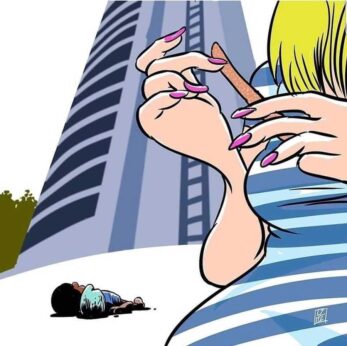
RECIFE, Pernambuco (Brazil) — Last week, newspapers here reported that the Regional Labor Court of the 6th Region had sentenced the former mayor of Tamandaré, Sérgio Hacker Corte Real, and his wife, Sari Mariana Costa Gaspar Corte Real, to pay R$2.01 million (approx. US $400,000) in damages to the family of Miguel Otávio, who died after falling from the 9th floor of the luxury building where the couple lived, and the child’s mother worked as their maid. The verdict, which will still be appealed by the couple, came more than three years after the child’s death. I wrote about this case, yet another crime against Black people in Brazil, three years ago (Vermelho, June 5, 2020), as follows. Sadly the echoes of this case can be found not only all over Brazil but everywhere touched by the history of slavery and exploitation.
The case of little Miguel, the son of domestic worker Mirtes, reveals the horror of class injustice in Brazil—and in this crime, the current custom of killing Black people among Brazilians.
I’m not exaggerating. There can be no exaggeration in the face of a Black child, regarded with contempt, who fell from the ninth floor to the ground. We can’t even talk about this death as a tragedy, such is the ubiquity of how Black life is nullified, from the slums in Brazil where they are hunted, to the domestic servants who work and serve under “friendly” (read: false) relationships. The case of Miguel Otávio and Mirtes Renata, son and mother, is the very model of a crime that goes unpunished—or certainly not punished severely enough— a bloody crime from which we can draw lessons before, during, and after its occurrence.
In the first lesson, we see the comfortable happiness of the relationship between masters and domestic workers. Or rather I should say, the comfortable happiness of masters who translate it into the happiness of their maids. “They have nothing to complain about. I give them everything,” they say. “Here at home, a maid is a member of the family,” they shamelessly boast.
The curious thing is that, in these kind words, they are almost sincere. They want to say, without daring to express it, that their little Black girls receive far more than they get from other caricatures of cruelty. And indeed, in their homes the maids eat—“and how they eat!” the master observes. They eat like animals, which means they have a centuries-old hunger that has never been satisfied. The maids sleep! Imagine! They even sleep? “They sleep better than me, poor me because I have insomnia.” This is rich. So in this chapter, in this lesson, we see more clearly who has gained insight into the experience of suffering.
A taxi driver once told me, out of the blue, apropos of nothing, “I can recognize, on the street, just by looking at them, who is and who isn’t a maid.” “How so?” I asked. He said, “At the bus stop, they always have wet hair and a little bag. You know why? At the end of the day, they take a shower and take home the leftovers from the boss’s lunch. To this day, I haven’t missed one. I know because my wife is a cleaning woman. She’s exploited!” he continued. “Often, at 7 o’clock at night, when it’s time to leave the house, the mistress arrives and asks her to prepare the master’s dinner. That’s when she doesn’t show up with some friends for drinks. Then my wife goes from cleaner to cook. She does everything for the lady.”
In the case of Mirtes Renata Santana de Souza and her mistress Sari Corte Real, their affection and good friendship even merited a beach house—in Tamandaré, on the south coast of Pernambuco, where master Sérgio Hacker Corte Real is mayor. Will you accompany His Excellency? Meaning: To escape the coronavirus outbreak in Recife, the master went to the beach house and took her maids and little son Miguel. Notice how the Big House of slavery from the good old days is reproduced. The masters “employed” an entire family in their home: Mirtes, her mother, and Miguel. In addition to affection, they also received the coronavirus, because the mayor fell ill and was cured. Meanwhile, the contaminated maids had to continue working, because cleaning and cooking can’t stop. Was Madame going to work like a Black woman? That’s all she needed! To hell with civilization!
 The second lesson, in blood. Minutes before Miguel fell, Madame was having her nails painted at home. She had been left with the little son of her maid, Mirtes, who had gone out to walk her Mistress’s dog. The child was left to play with Madame’s daughter. (Remember the little Black slaves who distracted the children of the plantation owners?) But Miguel’s misfortune was that he loved his mother too much. When she left, he started crying, begging for her shelter and lap.
The second lesson, in blood. Minutes before Miguel fell, Madame was having her nails painted at home. She had been left with the little son of her maid, Mirtes, who had gone out to walk her Mistress’s dog. The child was left to play with Madame’s daughter. (Remember the little Black slaves who distracted the children of the plantation owners?) But Miguel’s misfortune was that he loved his mother too much. When she left, he started crying, begging for her shelter and lap.
But why did the little boy, besides loving his mother, suddenly miss her affection so much? Only those who feel and have felt this lack would be able to tell. The fact is that the boy, stubborn, rebellious, “full of desires”—as if he wasn’t the son of a Black woman—annoyed the mistress so much that she had no choice but to leave him to his fate. Oh, fate, oh, fortune, oh, destiny! In other words: You want your mother? Go on. Good luck. In the video footage, the mistress appears to be taking the convict to his fate as a little Black boy. As she returns to her beautiful nails.
Suddenly, a thud, a small crash. When bones hit the ground from a great height, they sound like bombs. I’ve witnessed the sound of a man who threw himself from the top of the Holiday Building in Boa Viagem, Recife. But never a little boy. That’s why I give him a little bang for the noise of his broken bones.
And so we come to the third didactic lesson of a class crime in Pernambuco. In the first interview, after the “accident,” one of the investigators, when asked if there were people in the apartment where the child’s mother worked, replied, somewhat annoyed, “That still depends on the investigation.” Simple question, hidden answer. “Let’s wait and see what the boss says,” would be the best understanding of what the investigator answered.
The case was then treated as a tragedy, a fatality, or the fate of little Black boys who go where they don’t belong. Then come the statements from the relatives of the five-year-old victim, who say, “The boss and her manicurist were in the apartment.”
In the face of the outcry, the devil took an unexpected turn. They had to investigate further, to the unaccountable elite family’s door. True, the boss was held responsible for culpable crime. Those who don’t know about the world of law might think that culpable crime is the crime of guilt. But no, it’s a minor crime, because the perpetrator didn’t intend to kill. She killed unintentionally, by accident, “an act of fate,” as the police inspector said in an interview. So Mrs. Sari paid a bail of 20,000 reais (about US $4000) and left.
But justice for the people of Brazil demands more investigation and less fatal death. Instead of sadness and pitying looks, everyone wants to know: What did the manicurist, witness to the little child’s squirming and the mistress’s words, say before she took Miguel to his scaffold? If the manicurist was heard, what did she say? What’s more, has a psychologist been called in to interview the mistress’s little daughter who played with the boy in the apartment minutes before the fall? These are paths that could be taken, prior to the lesser classification of the mistress’s crime, which could be punished as a crime of intentional misconduct, because she took the risk of disposing of a child, placing him into an elevator for his last ride.
[Video documentation shows that she put Miguel into the elevator, pushed or indicated a button presumably to the first floor, and then exited, leaving Miguel alone. Miguel proceeded to push other buttons, including the alarm, and wound up on the 9th floor, where he exited, found an unprotected open window overlooking the ground below, and fell to his death.]
And finally, the fourth and terrible lesson. Mirtes Renata Santana de Souza’s successive interviews reveal a progression of lights turning on in her consciousness. What at first seemed like a tragic accident was later revealed to be a strange, almost pitying feeling when her beloved boss told her she was going to be arrested. Mirtes asked her: “How can you be arrested if you haven’t committed a crime?” In the question, there was a suspicion lurking in the distance, higher than the ninth floor of the Twin Towers, from which Miguel fell. But suspicion is a pain that comes and goes, even if it leaves some confusing clues. At first, Mirtes didn’t want to see the images of Miguel’s last minute in the elevator. But then she did, and what she saw caused her to revolt: The mistress led the most beautiful little Black man in her life and pushed the button for a floor of the elevator. She pushed it—or indicated it—which doesn’t diminish her crime of abandoning the five-year-old child. And she went back to her manicure.
Suddenly, there was a small bang. But not so sudden, because it was predictable.
(Minor edits to the original story have been made for clarity.)












Comments